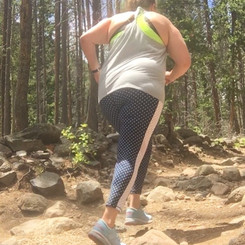Spirituality is Part of Recovery
- livinginthehotpink
- May 26, 2023
- 5 min read
I am a firm believer that eating disorder development and recovery isn’t just biopsychosocial. Basically, this means an individual’s relationship between genetics (biology), their environment (social), and personality traits (psychological) predispose someone to an eating disorder. I believe that spirituality is a huge component and all four are just as important in development and recovery.
I think sometimes, we as clinicians and even people, miss the importance of spirituality. I wholeheartedly believe we have souls and are spiritual beings. This post isn’t about imposing Jesus or my values on you. My hope is that it will provoke curiosity about your own being and how and if spirituality is part of your eating disorder development and recovery. I hope if you have never thought about this, it might be the missing piece to your recovery or even getting back on track at this moment.
For me, I had all of the biopsychosocial components that led me to use eating disorder behaviors to cope with my life. While I can’t speak to my own specific biological or genetic markers that make up my body and fit into the development of an eating disorder, I do know about the other factors. My personality is perfectionistic. I’m a black and white thinker as we all know. I struggle with anxiety and depression. I have trauma. I didn’t have a way to express or cope with the trauma of my life.
I grew up in an athletic family where my first years were spent with gymnasts at the club and collegiate level and then other sports as I got older. Specific types of food, weight, and body size were praised and expected. These narratives of diet culture were developed early on. It is also important to note here, that I grew up in a Christian culture, where I thought I had to be perfect in order to be accepted and loved by God. I had to get myself together before I could come before Him (or He would come to me). I also believed I needed to be thin to be loved by God. I received the message that larger bodies weren’t honoring to God. This was encouraged by adult female youth leaders in my church telling me discipline around food was honoring God. I fell prey to the Weigh Down Workshop in the late 90s as a teenager. For me, part of my eating disorder development was actually influenced by Christian culture.
Exposed to diet culture so young:
In high school and college, my relationship with Jesus was super tight. It was also very judgmental and legalistic towards other people. If the word “Christian” turns you off because of how we behave, that was me back then. I apologize to you. I lost sight of the fact that Jesus met people where they were at. He loved them well while teaching about God. I treated people the way I thought I had to be before I could be loved by God. If you weren’t living up to “my standard”, you were judged by me (even though I might be doing the same “bad things”).
Doing all the right things as a Christian: YoungLife Leader and Seminary:
Despite my struggle to be perfect before Him, He was still my rock. My life was very chaotic. Honestly, I just dug into reading the Bible, praying, and memorizing scripture because that was what I was told to do by the Church to be a “good Christian”. My life was too hard. During that time, I was constantly playing around with disordered eating and overexercising to feel in control. Those behaviors gave the illusion that I could handle life on my own and didn’t have to bother God with anything. It also believed a fantasy that if I looked the part (thin and athletic), life would be so much easier, and I would be ok. I could do it on my own and be perfect. The more I believed this, the further and further I moved away from God. Once I was fully in the eating disorder and in a relationship with “Coach” (name of my ED), I felt like I couldn’t be honest before God because I had messed up too much with this eating disorder.
There’s a Bible verse that haunted me during the depths of my eating disorder. I felt so much shame knowing it:
“No one can serve two masters, for either he will hate the one and love the other, or he will be devoted to the one and despise the other. You cannot serve God and money.”
-Matthew 6:24
For context, Jesus is preaching His famous Sermon on the Mount where he’s emphasizing moral teachings. The point of Matthew 6:24 is that you can’t serve both God and worldly things. He uses “money” to represent all of those things.
For me, this verse hit me almost every time I struggled with my body, exercising alone instead of hanging out with friends, engaging in behaviors, missing church functions because food was involved, and lying. I knew I was putting (or serving) Coach over God and it cut me deep. Instead of coming to God and talking about my struggle (shame free), I swept it under the rug and kept running–literally and metaphorically, which catapulted me even deeper into the disorder.
Trying to be the BEST athlete to earn love and make up for my shortcomings:
When in treatment, I addressed the biopsychosocial parts of my eating disorder and would do well. But I could never let go of the shame I had about trying to serve Coach and God. I felt like “I knew better” but couldn’t get free from Coach. The shame I experienced kept me confused about my identity, enslaved to Coach, and kept me hiding. How could I choose to “despise” the Creator of the Universe and my life itself over Coach? It also caused me to question who I really am? I knew the eating disorder wasn’t truly my identity but that is what fit at the time and made sense to me.
Years later, I broke. I let my pride, fear, shame, and expectations for recovery go. I found myself broken with tears streaming down my face before a relational and gracious God. I realized I was created for so much more. I realized God wasn’t mad at me (Thank you for the reminder, Pastor John Moreland.). He never left. He had ALWAYS loved me. It was me turning my back and running. Once I gave space for Him in my recovery, relying on His strength was profound. I didn’t have to do this alone on the inside. My heart softened. I was ready to do my trauma work while not engaging in behaviors. I had the best resource ever when I got triggered and wanted to turn to Coach for relief. I was more open to feeling all the feels, processing the grief, and stepping into the unknown and unpredictability with God, my team, my mentors, and my friends.
In my story, spirituality helped develop the eating disorder and deconstructing it was a big missing piece I needed to move forward. I knew I didn’t want to leave God. I needed to believe he was real and still there. Being curious and exploring also helped me find who I am today. The biggest realization for me was that I was created for so much more. That “much more” is loving people well as a friend, therapist, and advocating for eating disorder recovery. It's truly my passion and I feel like the real me when I’m in those roles. I feel like I’m being who God has called me to be in this world.
Guest speaking is my FAVORITE thing in the world:
Have you thought about your spirituality? Has it helped? Has it hindered you? Drop a comment below.
*For my philosophical and theologian friends out there. My blog has a lot of nuanced theology I couldn't address in a short post to a broad audience. Happy to talk more if you have questions, comments, or thoughts.
This is me and free and I still have ups and downs...







































































I really enjoyed your post. I haven’t read your blog in a long time. Mainly because I feel are relationship has changed. Anyways, my View on religion has changed I use to have a stronger relationship with God when you an I were closer. But after everything that has happened I have lost my faith and I do feel a bit lost. Would love to talk about it with you sometime. Much love
Anya
What a great post Mindy! Often, Christians have a skewed view of God. One of the incorrect beliefs is that we have to be better for him to love us. This couldn't be further from the truth. It was this legalistic thinking that Jesus most fought against while on earth. He came to love us just as we are. Thanks for making this point!